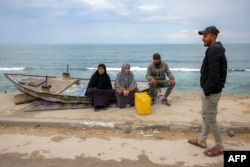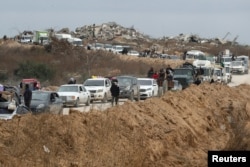Israeli Prime Minister Benjamin Netanyahu warned Tuesday that a ceasefire with Hamas will end and intense fighting will resume in Gaza if more hostages held by the militant group are not freed by Saturday.
"The military will return to intense fighting until Hamas is finally defeated," Netanyahu said in a video statement Tuesday.
U.S. President Donald Trump had earlier suggested canceling the ceasefire agreement between Israel and Hamas if all hostages are not released by Saturday.
Trump made his remarks Monday after Hamas accused Israel of violating the ceasefire and threatened to delay the release of three hostages set to be freed Saturday.
A Hamas official said Tuesday the only way for the captives to be freed was to respect the terms of the truce.
Hamas said Monday no more hostages would be released until further notice. The group — designated as a terrorist organization by the United States and several other countries — accused Israel of delaying the return of displaced Palestinians to northern Gaza, although hundreds of thousands have returned.
Hamas also said Palestinians were targeted “with airstrikes and gunfire across various areas” and said Israel has failed “to facilitate the entry of humanitarian aid as agreed.”
A United Nations official said 12,600 humanitarian aid trucks have entered Gaza since the ceasefire began and the immediate threat of famine has dissipated.
Since the ceasefire took effect last month, Hamas has freed 21 hostages and Israel has released more than 730 prisoners. The next exchange, on Saturday, calls for the release of three more Israelis in exchange for hundreds of Palestinian prisoners jailed by Israel.
In Paris, United Nations Secretary-General Antonio Guterres called on Hamas to adhere to the planned hostage release.
“We must avoid at all costs the resumption of hostilities in Gaza that would lead to an immense tragedy,” he said. “I appeal to Hamas to proceed with the planned liberation of hostages next Saturday.
“Both sides must fully abide by their commitments in the ceasefire agreement and resume serious negotiations in Doha for the second phase,” Guterres said.
Plan for Gaza
Trump has proposed moving Palestinians living in Gaza to unspecified locations outside the territory. Under his plan, the United States would take over Gaza and Palestinians would have no right to return.
In an interview with Fox News released Monday, he called his plan for the narrow territory along the shores of the Mediterranean Sea a "real estate development for the future."
“I would own it," he said, adding that the 2.3 million Palestinians now living in war-ravaged Gaza would be moved to as many as six different sites outside Gaza under a plan that the Arab world, as well as U.S. allies and adversaries alike, have rejected.
Trump was meeting at the White House with Jordan's King Abdullah on Tuesday.
"I do think he'll take" refugees, Trump said Monday of the monarch.
Asked if he would withhold aid from Jordan and Egypt if they declined to do so, Trump said, "Yeah, maybe, sure, why not. ... If they don't agree, I would conceivably withhold aid."
Abdullah has rejected any moves to annex land and displace Palestinians. He is expected to tell Trump such a move could spur radicalism, spread chaos in the region, jeopardize peace with Israel and threaten his country's survival.
Meanwhile, Egyptian Foreign Minister Badr Abdelatty told U.S. Secretary of State Marco Rubio on Monday that Arab states reject the plan to displace Palestinians and for the U.S. to take control of the enclave.
Egypt's Foreign Ministry said Abdelatty stressed the importance of rebuilding Gaza while Palestinians remained there.
After the meeting, the U.S. State Department issued a statement that did not explicitly mention Trump's plan but added that Rubio "reiterated the importance of close cooperation to advance post-conflict planning for the governance and security of Gaza and stressed Hamas can never govern Gaza or threaten Israel again."
Terms of the ceasefire
During the first six-week phase of the ceasefire, Hamas is gradually releasing 33 Israeli hostages captured during its Oct. 7, 2023, attack on Israel in exchange for a pause in fighting, freedom for hundreds of Palestinian prisoners and a flood of humanitarian aid into Gaza. The deal also stipulated that Israeli troops would pull back from populated areas of Gaza as well as the Netzarim corridor that bisects Gaza’s northern and southern parts.
On Sunday, Israeli troops withdrew from the corridor. It allowed more Palestinians to return to the northern sector where they once lived, but much of the land has been leveled by fighting.
In the second phase, all remaining living hostages would be released in return for a complete Israeli withdrawal from Gaza and a "sustainable calm." But details are unclear and have yet to be negotiated.
The war in Gaza was triggered by the shock October 2023 Hamas terror attack on Israel that killed 1,200 people and led to the capture of 250 hostages. Israel’s counteroffensive killed more than 47,000 Palestinians, more than half of them women and children, according to local health authorities. Israel says the death toll includes 17,000 militants.
Some information for this report came from The Associated Press, Agence France-Presse and Reuters.











